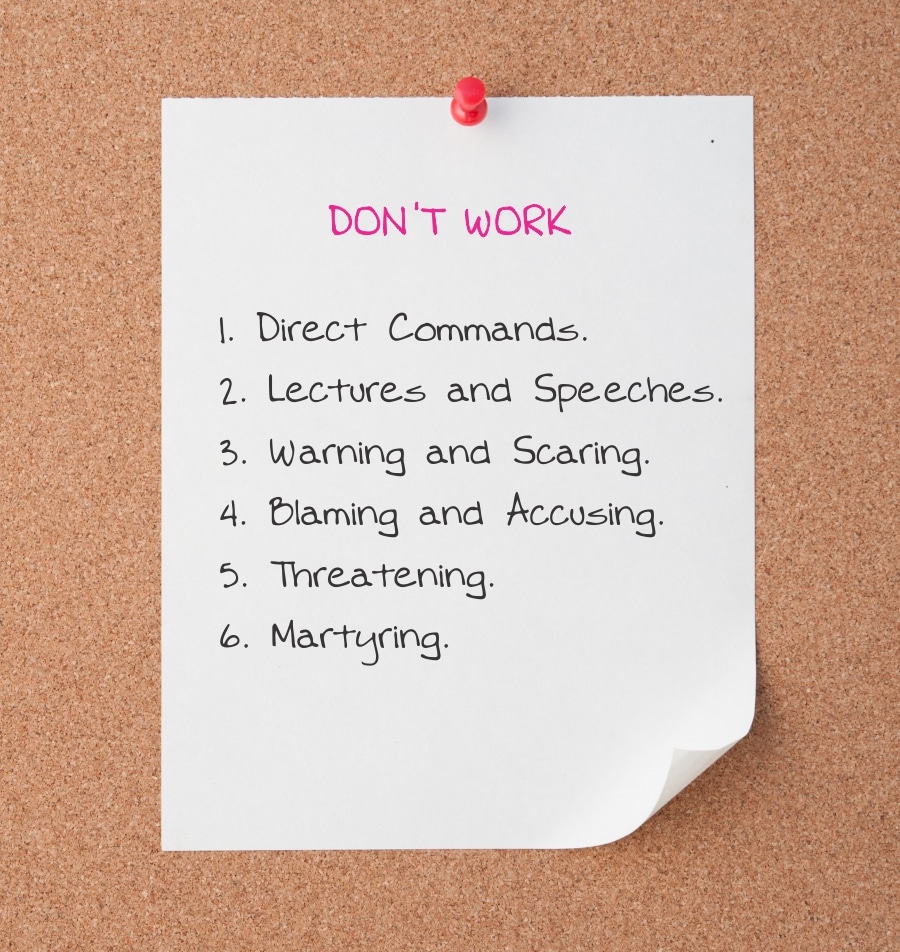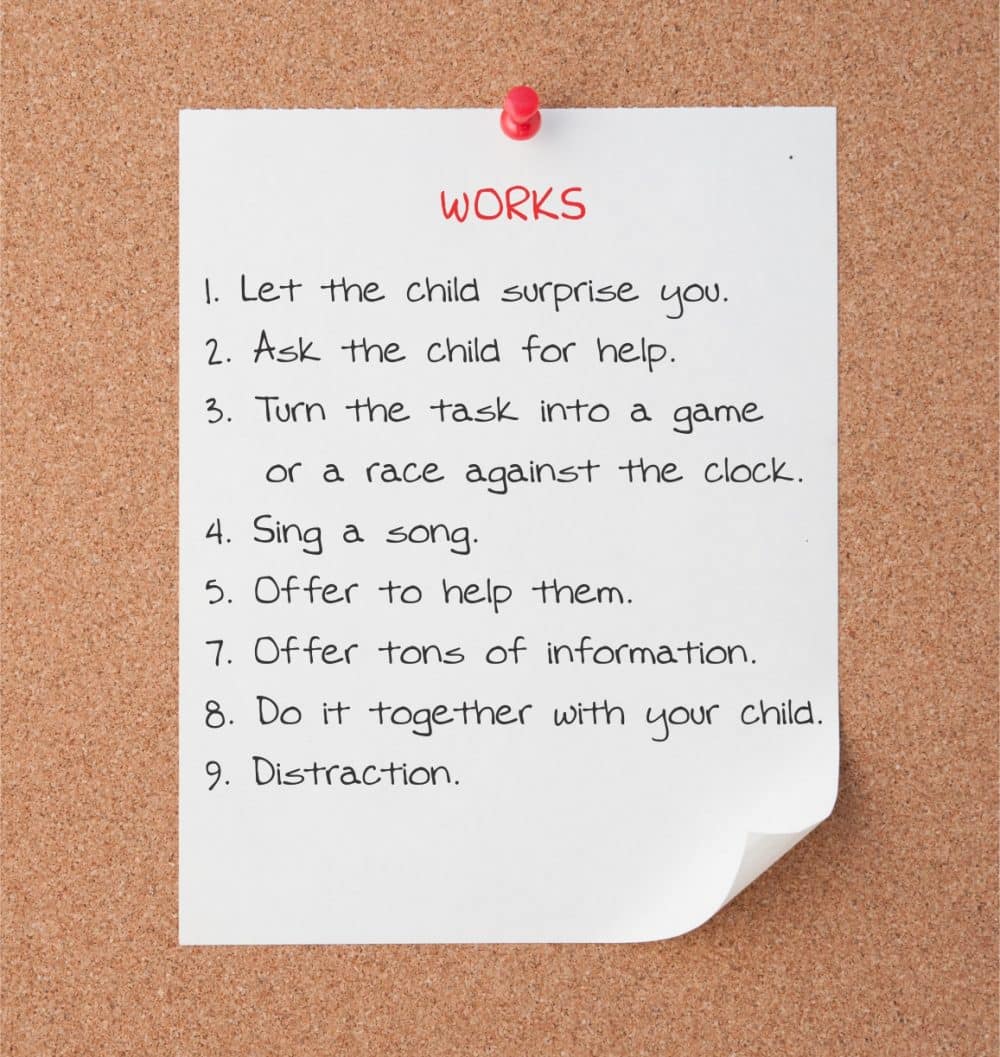Look inside your “mom’s toolbox” and discover the secrets of cooperation.
Unfortunately there is no magic answer to getting kids to listen to us. But take a peek in the toolbox. These tools are based on leading parenting experts; but more so, they’ve been tossed around a brainstorming session with some moms based on what actually works in our homes.
My actual toolbox simply consists of two pink post-it-notes attached to the inside of a kitchen cabinet. One note says “Don’t Work” and the other note says “Works.”
First, the…
“Don’t Works” Toolbox

Keep in mind that at times some of the “don’t works” are warranted; but if used too frequently they lose their effectiveness and certainly will not contribute to a happy, pleasant atmosphere.
1. Direct Commands: At best they can be natural. At worse, when given in a harsh or terse tone of voice, they can be negative.
2. Lectures and Speeches: In general, speeches are highly ineffective for every human being; kids are no exception. You say: “That’s really not nice to grab away your sister’s book; that’s really mean. How would you like if someone else grabbed your book? And do you really want to teach your little brother to grab away things from his siblings?”
Child hears, “Blah blah blah, my Mom’s a pain in the neck. Blah blah blah.”
3. Warning and Scaring: This comes from a good place, but you don’t want to instill too much anxiety into your kids. Avoiding dangerous objects (such as streets) is a serious thing; it should not be an anxious thing.
4. Blaming and Accusing. Never works for anyone!
5. Threatening: Use this one sparingly. And never retract or change your minds on a threat. Never! That will weaken you as a parent. The bottom line is to think VERY carefully before making a threat. Does this threat really make sense? For me? For the kid? And for the rest of the family? Because there’s no retracting it!
6. Martyring. It’s okay to let the child know that Mom is sad; but no long soliloquies about the late hour that mom got to bed because she was doing laundry, and how hard she worked on dinner, and how many hours she put in in work….
Okay, scratch those.
It’s on to the:
“Works” Toolbox

Only some of the “works” will fit your personality, your child’s, and the actual circumstance. And sometimes, it may take two or three of these tools until your child listens!
1. Let the child surprise you. Example: I’m running to the kitchen for a second….let’ see if you can surprise me and clean up the toys!
2. Ask the child for help. Example: Kid is making a ruckus in the grocery; she’s begging for gum, stickers, and ice cream and grabbing things off the shelf. Turn to her for help. Can you pick out four tomatoes? Then I need carrots…
3. Turn the task into a game or a race against the clock. Example: Yesterday it took three minutes to get dressed. Let’s see if you can do it quicker today!
4. Sing a song. Great for transitioning time, for kids who have trouble with transitions.
5. Offer to help them. Example: Let me help you get the pajamas out of the drawer, and here are your favorite sleeping socks; here I’ll help you get them on right…
6. Offer tons of information. Example: Kid refuses to brush his teeth. Offer him tons of information. Do you know why we brush our teeth? Because food gets stuck on and then if it’s not brushed off it can build up on the teeth and cause cavities…Then mix in number 8 (below) and start brushing while you’re enamoring your kid with tons of information!
7. Do it together with your child.
8. Distraction: This is my personal favorite. Example: Kid is grabbing his sister’s book. Instead of direct commanding him, or giving him a speech, distract him with a funny story that just happened with the baby. “Hey, come here, I have to tell you the funniest story!”
Are we weakening ourselves and beating around the bush with the nine “works”? Should our kids just be listening to us because we are the moms and we said so?!
We have to face reality: Kids don’t just listen all of the time, especially when they are overtired, hungry, and cranky. The “Works” allow us to move the day along while maintaining a pleasant atmosphere. Then, when we occasionally resort to a direct command or a threat, the child will recognize that Mom means business this time!
Special thanks to Shaindy Mozes
Read Sarah’s post “Three Easy Ways to Teach Emunah to Your Children.”




Great post. As much as we know it we constantly forget under stress. Thank you!
Love the concept of giving over tons of information.. I find that really helps my kids listen… especially my children that are oppositional. When they really understand how it’s good for them and why etc they listen so much better!!
So helpful and clear! Thank you.